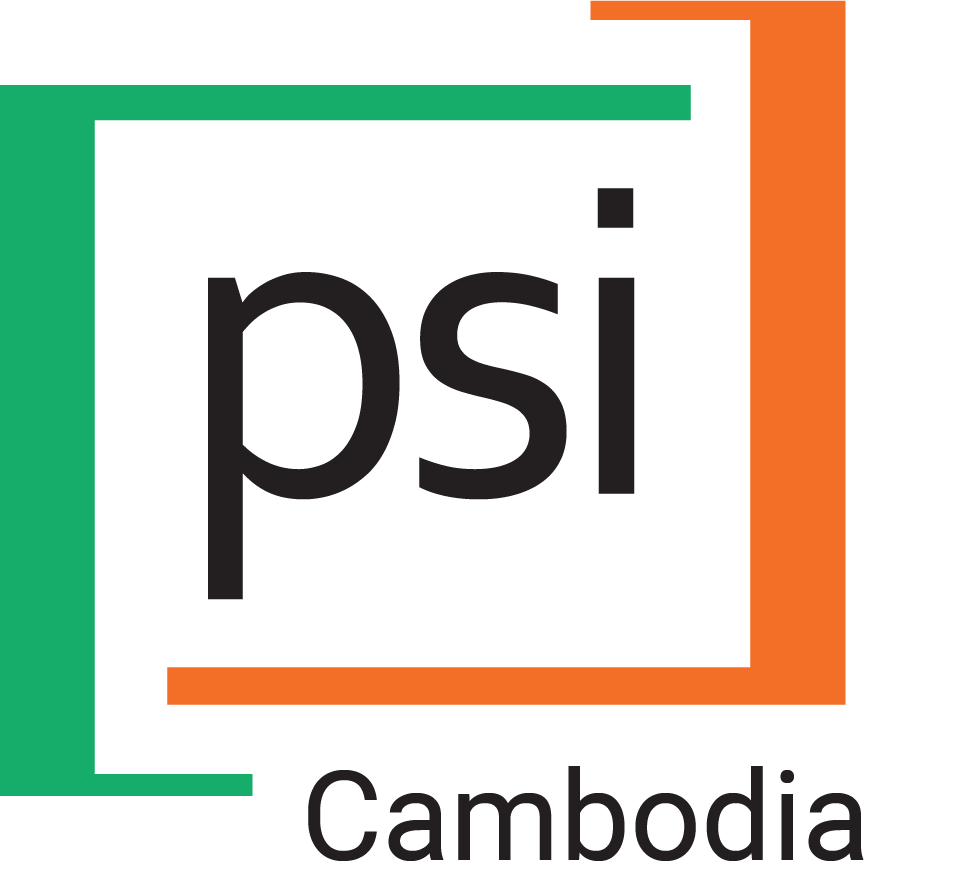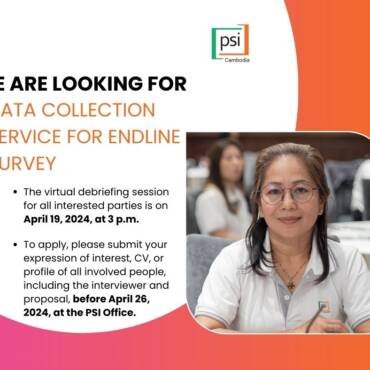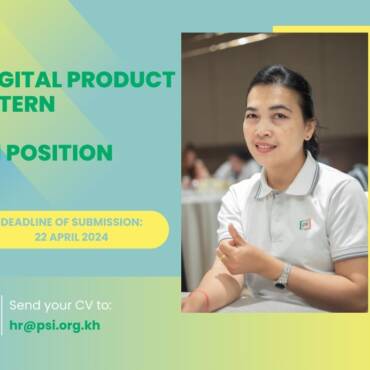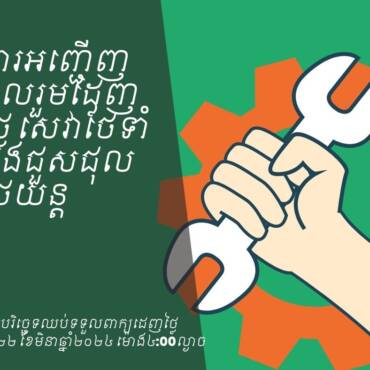Increasing Access to Safe Abortion – Women’s Health Project
Globally, unsafe abortions are responsible for 13% of maternal deaths.1 In 2000, Cambodia’s maternal mortality rate was one of the highest in the region at 437 deaths per 100,000 live births, with maternal deaths linked predominantly to complications from unsafe abortions, eclampsia, and hemorrhage. Despite the legalization of abortion in 1997, safe abortion remained out of reach for many women due to excessive and erratic fees, limited availability of high-quality abortion services from trained providers, limited supplies, and drugs of unknown or dubious quality.
Since then, sustained efforts by the Royal Government of Cambodia and key partners have achieved remarkable progress in expanding access to safe abortion and, as a result, by 2014 the maternal mortality rate had dropped to 170 deaths out of 100,000 live births.
THE WOMENT’S HEALTH PROJECT (WHP)
WHP was implemented by Population Services International/Cambodia (PSI/C) from 2008-2020 and played a pivotal role in developing a sustainable market for medication abortion (MA) and increasing access to safe abortion and post-abortion family planning (PAFP) in Cambodia.
KEY ACHIEVEMENTS
OVER 2M
combipacks of MA distributed, since 2009
OVER 2.8K
outlets stock PSI/C MA products, as of 2019
OVER 1.4K
women referred through IPC for safe abortion, since 2017
OVER 5K
post-abortion women referred for PAPF through IPC, since 2014
OVER 2.5K
network and non-network providers trained on pregnancy options since 2008
OVER 5.9K
providers and pharmacists received at least one provider behavior change communication (PBCC) intervention on MA, since 2010
EXPANDED AVAILABILITY OF REGISTERED MA PRODUCTS
In 2009, PSI/C research found that 87% of the abortion drugs on the market were manufactured in China, with packaging and instructions in Chinese, and 19% of drugs did not have the correct active ingredients to properly induce an abortion.
PSI/C registered Cambodia’s first safe MA product, Medabon®, in 2009 and began nationwide distribution the following year.
Under WHP, PSI/C distributed over 2,106,000 MA combipacks, including over 52,710 to Cambodia’s Ministry of Health (Graph 1). This includes both Medabon®, and PSI/C’s second brand of MA, Mifeso®, which was launched in 2018.
As of December 2019, 2,884 outlets across 94% of Cambodia’s districts had a PSI/C MA product in stock. The expansion of safe, quality-assured, and legally registered MA products into the market significantly decreased the use of unsafe abortion products — with the availability of abortion products manufactured in China containing instructions in Chinese decreasing from 2% in 2013 to zero by 2018 (Graph 2).
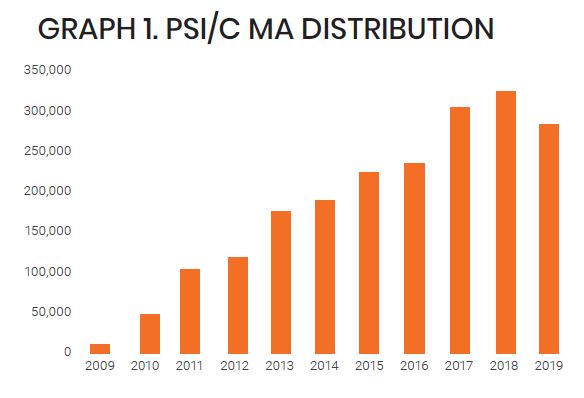
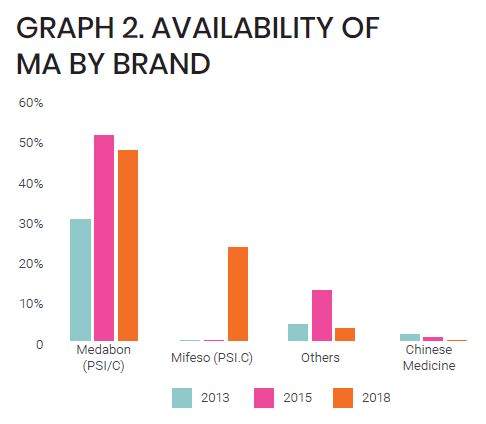
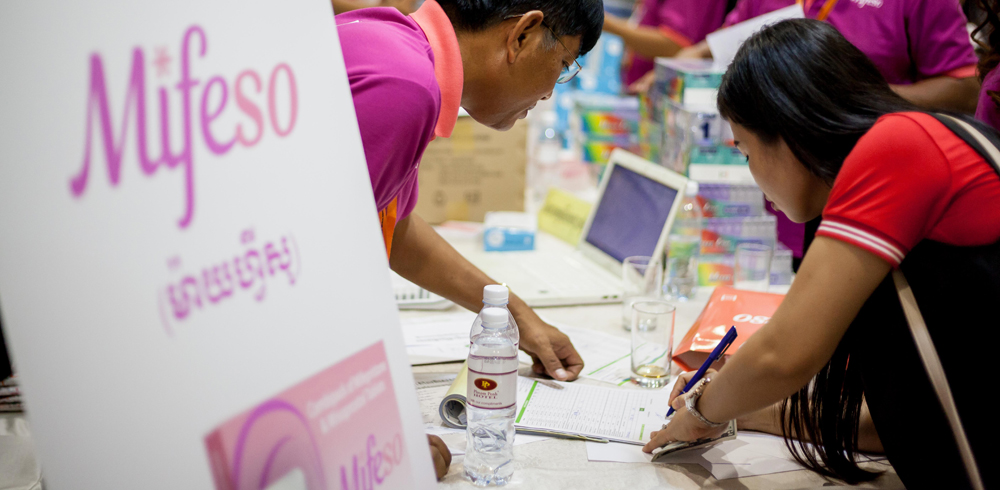
Creating a Sustainable Market for MA
With donor trends shifting away from subsidizing health commodities, it is imperative to have stable, established, sustainable markets in place to provide continued access to high-quality MA products.
In 2010, PSI/C introduced Medabon® at a highly subsidized price that ensured wholesaler margins were comparable with the unregistered and low-quality MA products already on the market. Since then, Medabon® has experienced year-over-year sales growth, accompanied by gradual price increases, and achieved cost recovery for the cost of goods sold8 in 2016.
By 2017, nearly two thirds (64%) of women who reported having an abortion used MA, 74% of whom used Medabon®.
As of 2020, Medabon® and Mifeso® were incorporated into the Enterprise Fund, PSI/C’s social enterprise which applies commercial principles to create a sustainable commodity supply chain and deliver sustained health impact. As part of the Enterprise Fund’s portfolio, both products will continue to be available to women across Cambodia, through multiple points of sale, beyond project close out.
INCREASED ACCESS TO INFORMATION AND SERVICES THROUGH SOCIAL AND BEHAVIOR CHANGE COMMUNICATION (SBCC)
SBCC activities were critical in increasing access to information on safe abortion and connecting women with the services they need.
DIGITAL TECHNOLOGY
Reproductive Health Hotline: Since 2013, the hotline has received over 107,440 calls, approximately 47,830 of which were related to abortion. Additionally, since 2016, the hotline has referred over 7,850 women for PAFP.
3-2-1 Service: In 2016, PSI/C produced a series of pre-recorded audio messages for Viamo’s Interactive Voice Response Service, 3-2-1, to increase access to information on safe abortion and family planning. As of July 2020, the 3-2-1 Service had received over 13,130 calls.
Youth-Friendly Facebook Page: Samphors Pannha has earned over 20,000 likes and more than 21,000 followers.
Audio Drama: PSI/C produced a 16-episode audio drama titled “Two Sisters, One Dream, and a Deeply-Buried Secret” and shared it across mass media, the 3-2-1 Service, and social media. Since the audio drama launched on the 3-2-1 Service in 2019, there has been a significant increase in the number of callers o the hotline, increasing from 559 callers in 2018 to over 8,000 in 2019.
INTERPERSONAL COMMUNICATION
Over the span of WHP, PSI/C used two IPC models: direct implementation by community mobilizers (CM) and indirect implementation by IPC agents through subgrants to local non-governmental organizations.
Since 2017, over 1,440 women were referred through IPC for safe abortion services.
The majority (84%) were referred to network providers and 15% were referred to public sector providers.
CM and IPC agents also followed up with women who recently had an abortion, to provide them with support and counseling on return to fertility.
Since 2014, CM and IPC agents reached nearly 15,000 post-abortion women and referred more than 5,000 for PAFP services.
EXPANDING ACCESS TO PAFP THROUGH THE MA MOBILE APP
To further expand access to PAFP, PSI/C developed and piloted a smartphone app that connects consumers who purchased a PSI/C brand of MA from a pharmacy to a private provider for follow-up care and contraceptive counseling.
1,621 CONSUMERS ENROLLED IN THE APP; 71% — or 1,154 — WERE REACHED BY THE PROVIDER
Of those who were able to be contacted, 64% received PAFP from a network provider (88) or a non-network provider (653), within 11 months of their abortion.
By leveraging technology to link consumers and existing health care providers, the smartphone app makes it easy for consumers to access the information, products, and services they need to make informed family planning decisions.
MA AT HEALTH CENTERS DEMONSTRATION
Expanding MA to the Health Center level has the potential to vastly increase access to safe abortion, particularly for women in rural areas. To inform the roll out of MA services to Health Centers across the country PSI/C, Marie Stopes International, Sugar Palm Foundation, and Clinton Health Access Initiative partnered to implement the MA at Health Centers Demonstration.
Findings from the demonstration clearly show that MA provision at the Health Center level can be implemented safely, effectively, and at an affordable cost to clients.
Across all four organizations:
- 98% of MA users had complete abortions
- The majority of women (from 51% to 90% depending on the pilot and project design) adopted a modern method of family planning within one month of the abortion.
IMPROVED PRIVATE SECTOR SERVICE DELIVERY
PSI/C improved private sector service delivery by training network and non-network health care providers on pregnancy options and providing ongoing support.
With support from WHP:
- Over 250 Sun Quality Health Network providers received training on pregnancy options and regular (3-4 times per year) supportive supervision visits.
- Over 2,510 network and non-network providers trained on pregnancy options since 2008.
- Over 5,900 providers and pharmacists received at least one PBCC intervention on MA, since July 2010.
THANK YOU
WHP was made possible through generous donor support and in partnership with key stakeholders.
PSI/C wishes to thank the Royal Government of Cambodia and local partners for over a decade of support and close collaboration. PSI/C would also like to thank each Sun Quality Health Network provider for their commitment to high-quality services and dedication to improving the health of Cambodian women. Finally, thank you to the entire PSI team for their invaluable technical support.
CONTACT:
DR. HENG KHENG
Sexual and Reproductive Health Director
kheng@psi.org.kh
SHIRINE MOHAGHEGHPOUR
Senior Technical Advisor, Service Delivery
smohagheghpour@psi.org
